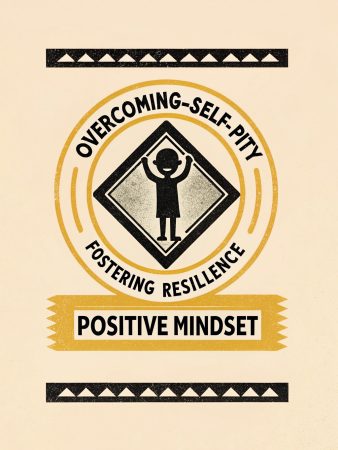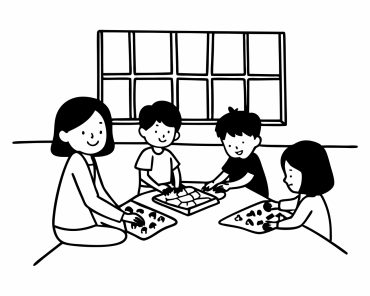
Question More, Action Knowledge.
Remember, at QMAK, we don’t just teach; we empower. We don’t just inform; we inspire. We don’t just question; we act. Become a Gold Member, and let’s unlock your child’s full potential, one question at a time.
Self-pity is a natural emotion that everyone experiences at times, but when it becomes a habitual response to challenges, it can limit a child’s emotional growth and resilience.
Children who frequently engage in self-pity may struggle with problem-solving, have difficulty recognizing their own strengths, and develop a passive approach to life’s challenges.
This guide provides research-based strategies and engaging activities designed for children around age 7 to help them move beyond self-pity toward a more resilient, solution-focused, and positive mindset.
Through these approaches, children develop the emotional tools they need to face challenges with confidence and optimism.

Helping children develop alternatives to self-pity:

Children learn by observing the adults in their lives. By demonstrating resilience, optimism, and healthy emotional management in your own behavior, you provide a powerful template for your child to follow.

Episode: Grandad
Despite worries for Grandad’s health, Chilli persistently follows him and the kids. Both adults model resilience and emotional management, offering positive behavioral templates.
Helping children understand, identify, and manage their emotions provides them with the foundation they need to move beyond self-pity toward more productive emotional responses.

Episode: Onesies
Brandy visits, struggling with sadness. Chilli helps Bluey understand Brandy’s complex feelings aren’t personal, teaching empathy and emotional intelligence beyond simple identification.
When children view challenges as opportunities for learning rather than reasons for despair, they develop agency and confidence in their ability to handle difficult situations.

Episode: Bike
Bluey struggles with her bike, but watching Bingo, Muffin, and Bandit problem-solve inspires her. The episode shows viewing challenges as learning opportunities builds confidence.
Practicing gratitude shifts focus from what’s wrong to what’s right, creating a powerful antidote to self-pity and fostering a more positive perspective on life’s circumstances.

Episode: Curry Quest
Bandit’s “Curry Quest” highlights community. Bingo and Bluey show gratitude by appreciating friends’ participation in the swap and Doreen’s timely magpie advice.
Setting achievable goals and recognizing progress builds confidence and creates a sense of accomplishment that counteracts feelings of helplessness associated with self-pity.

Episode: Ragdoll
Bluey and Bingo set realistic goals moving “Ragdoll” Bandit. Celebrating small successes, like making him wave, builds their confidence and sense of accomplishment
A foundation of security and unconditional love gives children the emotional safety they need to face challenges, express difficult emotions, and move beyond self-pity.

Episode: Perfect
Bluey strives for a perfect drawing, while Bandit doubts himself. Unconditional family love gives emotional safety to embrace imperfections and move beyond self-criticism.
Being mindful of the messages children receive from media and surroundings helps create an environment that fosters resilience rather than reinforcing negativity or victimhood.

Episode: Movies
At the movies, Bingo gets scared. Bandit helps manage her exposure by covering eyes, limiting negative influence and fostering resilience to media intensity.
Positive peer relationships provide emotional support, different perspectives, and opportunities to develop social skills that counter isolation and self-focus.

Episode: Bus
Playing “Bus,” Bluey interacts with diverse passengers (Dad, friends). This role-play builds social skills and understanding different perspectives, countering self-focus through connection.
Sometimes children need additional support beyond what parents can provide.
Recognizing when to seek professional help is an important part of supporting your child’s emotional wellbeing.

Episode: Bumpy and the Wise Old Wolfhound
While Bingo is in hospital, Chilli and the family send a video featuring a new story about Bumpy to show illness happens to everyone.
Each strategy section includes detailed activities, implementation guides, and tips for success.
When choosing activities, consider:

Remember that helping children overcome self-pity is a gradual process that involves:
To make the most of these activities:

Select any of the nine strategy sections above to find detailed activities and implementation guides. Each section provides practical tools and approaches that you can start using today to help your child develop a more resilient and positive mindset.
Remember: The goal isn’t to prevent children from ever feeling disappointed or sad, but to help them develop the emotional tools to move through these feelings constructively rather than becoming stuck in self-pity.
With patience, consistency, and the right approaches, children can learn to face life’s challenges with resilience, optimism, and confidence in their own capabilities.
When you fall down, it’s okay to cry
But remember, the sun’s still in the sky
Verse 1
Little hands scraped from the playground fall
Tears streaming down as you hit the wall
I see you sitting there with your head hung low
Thinking the world’s got nothing but “no”
Seven years old with a mountain to climb
Feeling like maybe you’re out of time
But there’s more to you than meets the eye
More strength inside than you realize
Pre-Chorus
It’s not about never falling down
It’s what you do when you hit the ground
Look up, stand up
Chorus
You can rise again
After the rain
Find your strength within
Push through the pain
Everyone stumbles, everyone falls
That’s not what matters at all
What counts is you rise again
Yeah, you rise again
Verse 2
Making a list of the good in your day
Finding small victories along the way
Sharing your worries instead of hiding alone
Growing your heart in ways you’ve never known
When friends come running to play outside
But you’re stuck thinking about what went wrong
Take a deep breath, count to ten
Remember tomorrow’s a fresh start again
Pre-Chorus
It’s not about having it all figured out
It’s learning what living is all about
Look up, stand up
Chorus
You can rise again
After the rain
Find your strength within
Push through the pain
Everyone stumbles, everyone falls
That’s not what matters at all
What counts is you rise again
Yeah, you rise again
Bridge
When the world feels too heavy to bear
Remember you’re never alone there
The strongest trees bend in the storm_
But they don’t break, they just transform
Rise up (Rise up)
Stand tall (Stand tall)
Try again (Try again)
Answer the call (Answer the call)
Final Chorus
You can rise again
After the rain
Find your strength within
Push through the pain
Everyone stumbles, everyone falls
That’s not what matters at all
What counts is you rise again
Yeah, you rise again

Remember, at QMAK, we don’t just teach; we empower. We don’t just inform; we inspire. We don’t just question; we act. Become a Gold Member, and let’s unlock your child’s full potential, one question at a time.